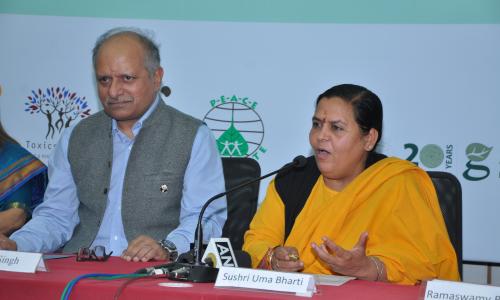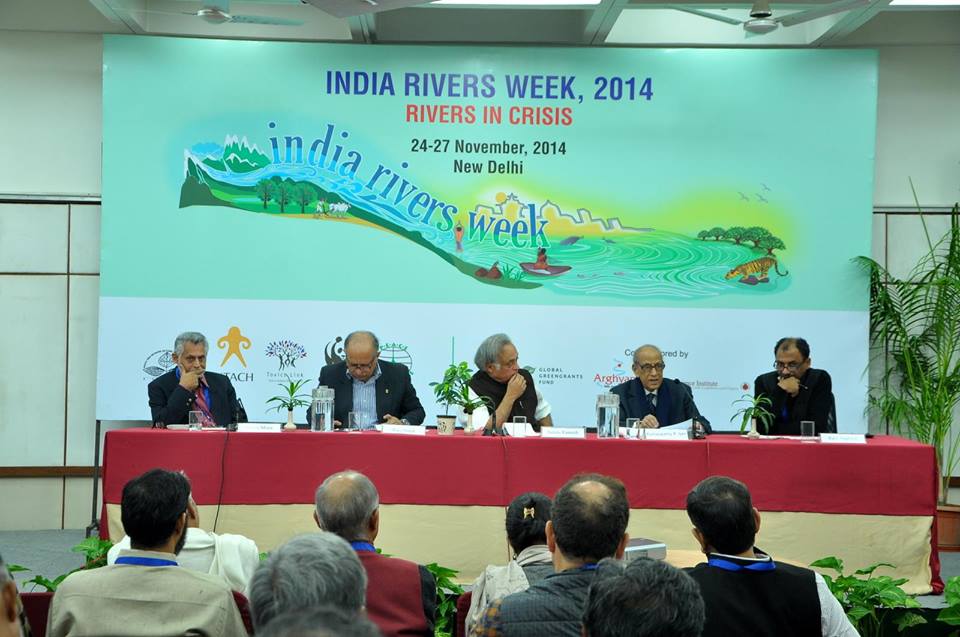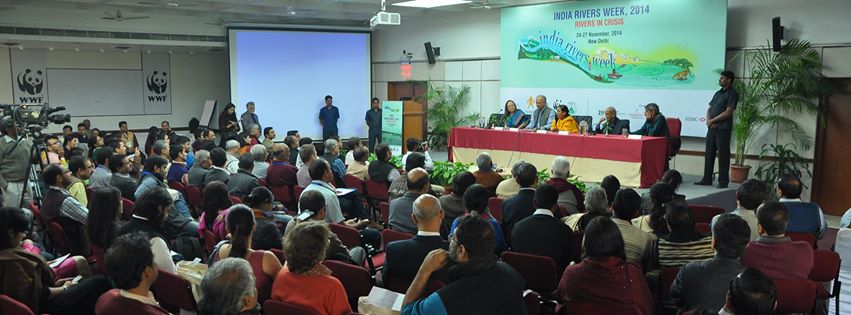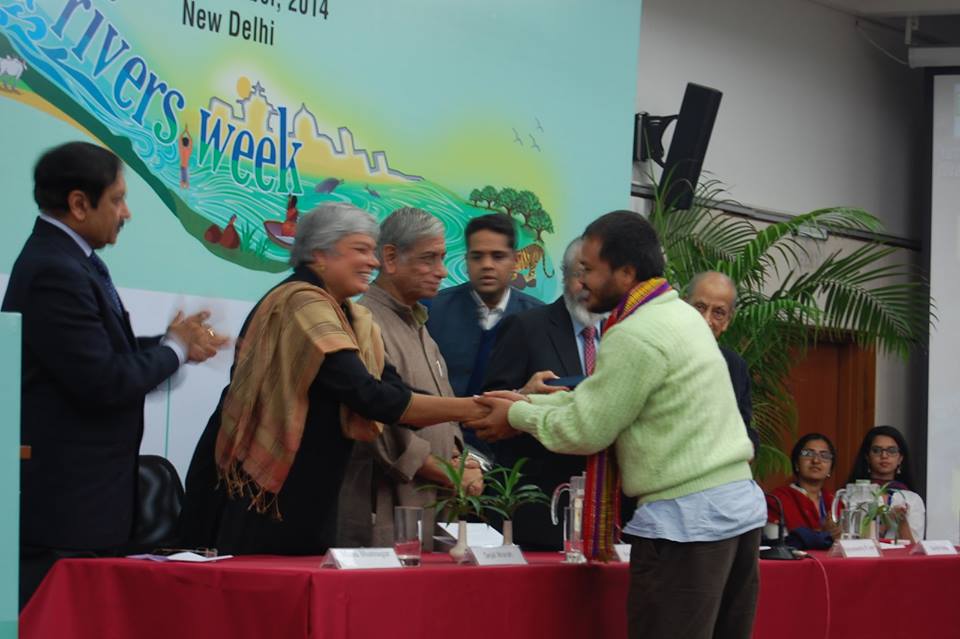
The first ever India Rivers Week 2014 (IRW 2014), a conclave to enable learning and promote river restoration skills and actions from sharing and exchange of ideas, experiences and practices was held between November 24 th and 27th, 2014, at New Delhi.
Over 125 river experts, planners, researchers, artists, enthusiasts and activists from different parts of the country congregated at the event, which was organized by a consortium of NGOs including WWF India, INTACH, SANDRP, Toxics Link and PEACE Institute Charitable Trust, with additional support from Arghyam (Bengaluru), International Rivers (Mumbai), and Peoples Science Institute (Dehradun).
Day 1: 24 th November, 2014
Former Union Minister Jairam Ramesh, giving the inaugural address at the first ever India Rivers Week emphasized, “Ours is a paradoxical society. While we show a lot of respect for rivers socially, we deal with rivers with utmost unconcern and disrespect. India Rivers Week and India Rivers Forum is most welcome, will look forward to participate in it. If we want to save our rivers, the first step is to ensure that no untreated industrial effluent or sewage finds its way into our rivers”. Speaking on development objectives and the growing energy needs of India, he clarified, “Hydro projects may be a painful choice, but we cannot close our doors to it. What we can do is ensure stricter environmental regulations & their enforcement, a cumulative assessment at ‘basin’ and not ‘project’ level and the minimum environmental flow in the river itself.” He was critical of the current dispensation to dismantle all environmental regulations.

Ramaswamy R Iyer, former Secretary to the Government of India stressed in his keynote that rivers are, ”more than just water, and an integral part of our social, historical and cultural fabric.” He spoke on how we obstruct river flow, encroach flood plains, inflict pollution, and hold a economical, cavalier attitude towards it. In other words, “As an American engineer rightly said, we enjoy pushing rivers around,” he added.
Recently the Union Finance Minister Arun Jaitley during his budget presentation pitched for inter-linking of rivers saying the move can yield “rich dividend”. Jairam Ramesh, former Minister, MOEF however stated “We seem to be indulging in the romance of ILR. We need to be more cautious in hurrying up the proposed Inter Linking Rivers projects,” he said, “and understand their ecological and environmental consequences better.” He urged for more debates on water agreement treatise and better co operation within states and also between the neighboring countries.
“Not only are our rivers misunderstood but mistreated and thoroughly abused”, said Manoj Misra, Yamuna Jiye Abhiyaan. “We need to move beyond the understanding a river simply in terms of water.” What makes this event significant is that the practitioners gathered here, through their experience sharing session and discussions, “will generate, adopt and present a Nation River Charter at the end of the meeting.”
This is the first of conclave to enable learning and promote river restoration skills and actions from sharing and exchange of ideas, experiences and practices. “There has been 76 per cent reduction in aquatic biodiversity over the years. That figure is higher than the loss of terrestrial or marine biodiversity, showing the crisis rivers are facing and we need to act fast to address this crisis”, added Ravi Singh CEO, WWF in his welcoming opening remarks.
Lack of true understanding and appreciation – amongst planners, decision makers, various government departments as well as the common man – of rivers as ecological systems that provide a number of ecological and economic services is a major reason for the sorry state of our rivers. No wonder, there exists no national policy or law that could provide our rivers security from death, degradation and unsustainable and unfair exploitation.
Ravi Agarwal, Toxics link, reiterated, “Rivers are diverse ecosystems, where water is just a common defining system”, and hoped this ‘unique meeting’ would debate thoroughly on this complex issue.
A recent appraisal has found that there is no river in any of the top 50 cities in the country that is not sick or dying with river Yamuna in Delhi-Mathura-Agra and Ganga in Kanpur-Varanasi-Patna leading the list. Widespread devastations in Uttarakhand (June 2013) and J&K (Sept 2014) and Assam-Meghalaya in North East (September 2014) bring home the fact that disturbed rivers can become dangerous and highly devastating.
Dams, diversions, bumper-to-bumper hydro projects, diverted natural flows, encroached flood plains, embanked river channels, degraded catchments, destruction of local water systems and pollution of various kinds are causing this. Climate change uncertainties are expected to further compromise the integrity of our rivers.
Ramaswamy Iyer observed, “Disputes rarely come in question when a river is free flowing. Only when water distribution come into play, as in the case of large projects, and issues of power crop in, do conflicts increase.” Speaking strongly against the ‘run of the river hydro projects’, and their ‘green’ tag , he wondered “Can we survive the death of our rivers?” Rivers have been dammed, diverted, channelized, encroached and polluted no end. Rivers, as ecosystems, have been poorly appreciated.
The compilation ‘My River Journey’, containing river journey accounts of 47 of the participants has been prepared, published and distributed at the IRW-2014, conclave on 24 Nov, 2014.
Day 2: 25th November, 2014
Ramaswamy R Iyer, former Secretary to the Government of India, defined the river as "A natural organic hydrological ecological system that flows & performs many functions." The attempt was to pen an aspirational, visionary and implementable definition of rivers to underpin an India Rivers Charter", to be prepared at the end of these deliberations.
Manoj Misra of PEACE Institute, New Delhi, speaking at the India Rivers Week-2014, said the working group he convened defined river as a, “Hydrological, ecological, geomorphic living entity containing other life forms, landscape level ecosystem in dynamic equilibrium between rainwater, snow, glaciers surface water, groundwater, sea, estuary and providing a large number of social, cultural, ecological and economic services to people and ecosystems all along its basins.”
Can we think in terms of 'rights of the river' and then make it part of some legal system, questioned different groups. The groups were discussing the rivers right to unfettered flow, space for flood plains, flood, breathe, perform ecosystem functions, lateral connectivity and natural water.

Manu Bhatnagar, INTACH, representing the deliberations of another group said, “River is a living commons that drains a catchment along a natural course with natural and dynamic flow and providing ecological goods and services necessary for the development and sustenance of human civilizations under challenging social, economic, political and climatic drivers.” Speaking on the issue Professor Brij Gopal noted that, "River regulation is the root of all problems. We need to regulate human activities".
“We are not obliging the rivers by editing her flow, we in fact are obliged by the rivers due to their life-giving flows”, said Mallika Bhanot, representing another group.
The conference also deliberated on what a river is not. Manshi Asher said that a river is not static, an artificial drain, lifeless, embanked/ obstructed, without sand and sediments, carrier of wastewater or just a channel of water.
A living, wide, water course which has natural fresh, flow of water above and under the surface, in its course, nurturing life forms, ecosystems, culture, conserving biodiversity in it and is inclusive of small and big tributaries in its catchment area.
Shashank Shekhar explaining about river flows, clarified, “The flow with its natural variability includes natural water, nutrients, sediments and biota and is the defining characteristic of river systems.” Dinesh Mishra, Barh Mukti Abhiyan, said, “Rivers are self cleansing, flooding is purifying and rivers become pure after floods.” Pranab Choudhary discussed the issue of conservation of biodiversity as against utility and noted the importance of defining and protecting rights of riparian communities especially the poor, including from downstream areas, today these are neither assessed, nor compensated.
Paritosh Tyagi summed up the discussion by saying that the older concept of River Action Plan that focused on river flow should be replaced with focus on the complete basin.
The organizers have brought out the 2015 desk calendar featuring the photos of 12 different rivers and highlighting the sacrifice tribals have made during the famous struggle against the Koel Karo project in Jharkhand.
Day 3: 26th November, 2014
Ramaswamy R Iyer, former Secretary to the Government of India moderating the open debate on “interlinking of rivers” at the first ever India Rivers Week said “interlinking of rivers has nothing to give to drylands of India”. Himanshu Thakker, SANDRP, New Delhi, a panelist at the session deplored the lack of scientific basis of the project and said “there is a need to do a proper basin and sub-basin wide options assessment for water resources management and development. Such options assessment would include local rainwater harvesting, watershed development, groundwater recharge, local water systems, optimum use of existing water resources, proper cropping pattern, System of Rice Intensification, treatment and recycling of effluents and demand side measures”. No such assessment has happened in any river basin or even any sub basin in India.
The participants discussed the issue in the wake of the present government’s move to ‘fast-track’ interlinking of rivers. They reached a consensus that “interlinking of rivers, not viable, desirable, optimal or necessary”. The group was apprehensive that the project would amount to committing a deliberate hydrocide. The sense of the house was that the government should not go ahead with interlinking of rivers till such basin wide options assessment has happened in consultation with and with consent of the gram sabhas and communities.
Ramaswamy R Iyer speaking on the occasion expressed his distress at the move to expedite the project on interlinking of rivers. He stressed that the project is fundamentally flawed and potentially disastrous. The deeply disquieting judgment by the Supreme Court in 2002 was a case of judicial overreach, he said.
Himanshu Thakker questioned the soundness of the project in terms of the various benefits that are claimed on its behalf. “Groundwater constitutes the bulk of the water that is used in agriculture, drinking and industrial sectors and the government needs to wake up to this reality. It should focus on increasing groundwater recharge and at the same time taking up community led regulation and demand measures to reduce groundwater exploitation”, he said.
Speaking on the occasion Brij Gopal, an eminent ecological scientist who had worked extensively on the Ken-Betwa river ecosystem questioned whether the Ken river had any surplus water and why the people of the area where the proposed Doudhan dam in a tribal dominated area is being constructed have not been consulted. He also wondered how the detailed project report has put forth different per capita basin water requirement for the two basins with similar basin characteristics. The loss to Panna Tiger Reserve and the Ghariyal sanctuary in the downstream of Gangau dam will be immense owing to submergence. The loss to the natural flow of the river and aquifers and the permanent damage caused to the environment was highlighted by him.
Manoj Misra, PEACE Institute, New Delhi speaking at the India Rivers Week-2014 said that “there is a need for urgent reconsideration of the decision”. He urged that the union government supplement its talks with various state governments with civil society moves to bring the peoples voice to the forefront.
Suresh Babu, WWF, India raised the issue of economic feasibility of the interlinking project which is slated to cost a whopping 11.2 lakh crores rupees. “From where will the government recover the costs when irrigation will be unable to marginally recover even the running cost, let alone the project establishment cost. Who is driving this project?”, he questioned.
Shankar Sharma, power policy analyst from Shimoga speaking on the occasion said that the power sector demand-supply deficit stands at just 11 per cent and can be easily managed by improving the efficiency since potential of saving though efficiency improvement is much higher. Hydro projects are not required or justifiable for peaking power. We need a national debate on how much electricity we need and what is the optimum way of achieving it.
Shuchi Vora, WWF-India representing the deliberations of the group on “river pollution and encroachment” said, “Rivers are considered to be self-cleansing, and hence overburdened. Most rivers are dead or dying due to pollution and this shows complete failure of governance. Polluters get represented in governance, but affected have no role".
Anil Gautam, speaking on the issue of “Overexploitation of rivers” said that a river can be called overexploited where longitudinal connectivity of river water, lateral connectivity with floodplain & river valleys, and vertical connectivity with subsurface water is broken. “Any use that goes beyond the basic needs & requirements of rivers and before meeting the needs of the riparian communities or negatively effects their basic needs can be called overexploited”, the group noted.
There is a need to adhere to recommendations of World Commission on Dams, said Jiten Yumnan representing the group on “Dams, embankments, barrages, HEPs”. “The commons nature of rivers has to be respected in all aspects”, he said. Cumulative impacts and carrying capacity studies of river based projects should be conducted and environmental clearances should be valid for only five years. All new projects should be halted till post facto impact and performance assessment of all existing projects in the river basin, the group felt. There is a need to assess existing and under construction hydroelectric projects and barrages for its climate change implications and disaster potential.
“Constitution talks about rivers in a restrictive context. This need to be revisited closely”, said Videh Upadhyaya, Lawyer representing the group on “Unprotected status of rivers & river conflicts”. The right of rivers and right to water/right to environment under Article 21 of the Constitution needs to be understood clearly. Right of rivers to be an ecosystem needs to be legally acknowledged. The River Basin Management Bill, 2012 needs to be revisited to remove many lacunae. Sustainable abstraction limits need to be legally defined and enforced. No stretch of rivers should be privatized.”, he said.
Day 4: 27th November, 2014
Uma Bharati, Union Minister of Water Resources, River Development and Ganga Rejuvenation speaking in the valedictory function of the first ever India Rivers Week hailed the first ever event on the vital issue. She emphasized “if we want to save our rivers, the first step is to ensure that no untreated effluent or sewage is mixed with treated water and finds its way into our rivers.” Speaking on the issue of interlinking of rivers, she clarified that strict environmental regulations will be enforced while taking up the project. “River based projects may be a painful choice, but we cannot close our doors to it as it yields ‘rich dividends’ for the people”, she said. She assured that minimum environmental flows will be maintained in the river itself and that a taskforce has been set up to “understand the ecological and environmental consequences of interlinking of projects”. “Government will not proceed with interlinking of rivers if environmental consequences are adverse”, she said. Manoj Misra, member of the organizing committee of India Rivers Week cautioned her not to proceed hurriedly on the project given its adverse social and ecological consequences.
The Indian Rivers Week-2014 conference awarded individuals and organizations the “ Bhagirath Prayas Samman” for their dedicated work on river integrity and safety. Mr Justice Madan Lokur, Hon’ble Judge, Supreme Court of India was the Chief Guest at the Awards Ceremony, held on 26 November, 2014. Speaking on the occasion he stressed on the need to put in place alternative dispute resolution mechanisms to resolve water conflicts. Courts are not the best option for this, he said. Sri Anupam Mishra, Gandhi Peace Foundation, who was the Guest of Honour in this ceremony spoke on the value of time-tested systems of water harvesting and the need to promote the use of indigenous knowledge to solve water problem instead of gigantic and destructive schemes like interlinking of rivers.

The awards were given to the following extraordinary individual/ organisations:
Dr Latha Anantha, Chalakudy Puzha Samrakshana Samiti who has worked on safeguard the integrity of the river Chalakudy (Kerala) was awarded for her exemplary capacity for combining sound research with the mobilization of community, political and state agencies, and for ushering in a unique methodology of consensus- based conservation of rivers in the country.
Akhil Gogoi, Krishak Mukti Sangram Samiti who has successfully utilised the Right to Information Act in conjunction with mass mobilization of communities with respect to ill conceived projects in river Subansiri (Assam) that could threaten their life, property and livelihoods. Due to the efforts of KMSS led by Akhil Gogoi, in association with a number of other organisations, the government had to make large number of changes in the construction and operation of the Lower Subansiri project and work on the project has remained stalled for close to three years now.
Koel Karo Jan Sangathan, an organization born in 1976 for untiring efforts to safeguard the integrity of the rivers Koel and Karo (Jharkhand). Koel Karo Jan Sangathan has through community mobilisation effort to conserve their sacred sites and to look at alternative development paths in place of the proposed Koel Karo hydroelectric dam. The Sangathan has carried on a long and heroic struggle in the face of enormous pressures from the vested interests, battling tremendous odds to forge one of India’s foremost resistance movements to save rivers, riverine communities and their culture. The Sangathan has demonstrated the use of many innovative methods of struggle including people’s curfew and people’s check points.
K J Joy, SOPPECOM, Pune speaking on the issue of community initiatives for conflict resolution on rivers said that “there is a need to recognize the complexity, diversity and heterogeneity of conflicts around rivers. These conflicts often end up in courts for redressal. The experiences and struggles reveal limitations in the processes being handled in the court, thus raising the question of whether courts/tribunals are adequately equipped to redress these conflicts. At the same time there are several community evolved and driven resolution mechanisms, sometimes in the form of customary practices. These are often co-opted and/or sabotaged by vested interests and inappropriately mandated state agencies/ laws. There is a need to search for policy, legal and institutional avenues for legitimizing these resolution practices, and also frame alternative mechanisms within a normative framework of social justice, sustainability, and equity and democracy.”
Bhai KK Chatradhara on behalf of the group on “Campaigns for protection or rejuvenation of rivers” said that “river rejuvenation should be looked at from a holistic perspective – from source to sea. Cumulative Impact Assessment including downstream impact assessment should be done before taking up of any new project. That should require consultations with and consent of Gram Sabha and local panchayat raj institutions. Local community people should be involved in discussions and decision making processes at all levels. Effective cost benefit analysis including options analysis and direct and indirect costs incurred such as cost of decommissioning, aesthetic and landscape loss, disaster potential of an area should be assessed. Sand auditing should be carried out.”
Prita Dhar representing the group on “Good legal interventions and secured rivers” pointed that “there is a need for a ddressing outdated laws and standards, gaps and for accounting for changes in technology.” The g reater role of panchayati raj institutions and local communities in governance was stressed. The group also recommended the need for u se of legal spaces to develop best practices and do go for strategic litigation.
Sudhirendar Sharma, speaking on behalf of the group on “Dams decommissioning and restored rivers” said that “decommissioning of dams is new in the Indian context and in the light of the Mullaperiyar Dam, highly contentious and political. The arguments favoring decommissioning, if at all, are in a nascent stage both in terms of arguments, language and its presentation. The idiom of decommissioning has yet to be located. Locating decommissioning in the context of potential politics is weak in argument and smells of what critics might argue as a case of kinetic politics.”
With ‘Rivers in crisis’ as the theme, the Conference endeavors to devise a National Charter for Rivers and promote a National Forum for Restoration of Rivers.





